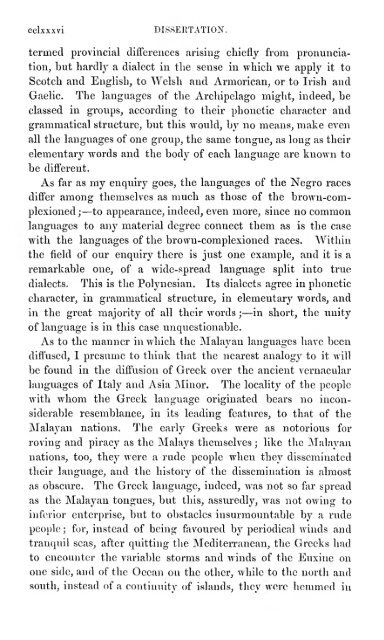A grammar and dictionary of the Malay language : with a preliminary ...
A grammar and dictionary of the Malay language : with a preliminary ...
A grammar and dictionary of the Malay language : with a preliminary ...
You also want an ePaper? Increase the reach of your titles
YUMPU automatically turns print PDFs into web optimized ePapers that Google loves.
cclxxxvi DISSERTATION.<br />
termed provincial differences arising chiefly from pronuncia-<br />
tion, but hardl}' a dialect in <strong>the</strong> sense in which we apply it to<br />
Scotch <strong>and</strong> English, to Welsh <strong>and</strong> Armorican, or to Irish <strong>and</strong><br />
Gaelic. The <strong>language</strong>s <strong>of</strong> <strong>the</strong> Archipelago might, indeed, be<br />
classed in groups, according to <strong>the</strong>ir phonetic character <strong>and</strong><br />
grammatical structure, but this would, by no means, make even<br />
all <strong>the</strong> <strong>language</strong>s <strong>of</strong> one group, <strong>the</strong> same tongue, as long as <strong>the</strong>ir<br />
elementary words <strong>and</strong> <strong>the</strong> body <strong>of</strong> each <strong>language</strong> are known to<br />
be different.<br />
As far as my enquiry goes, <strong>the</strong> <strong>language</strong>s <strong>of</strong> <strong>the</strong> Negro races<br />
differ among <strong>the</strong>mselves as much as those <strong>of</strong> <strong>the</strong> brown-complexioned<br />
;—to appearance, indeed, even more, since no common<br />
<strong>language</strong>s to any material degree connect <strong>the</strong>m as is <strong>the</strong> case<br />
<strong>with</strong> <strong>the</strong> <strong>language</strong>s <strong>of</strong> <strong>the</strong> brown-complexioned races. Within<br />
<strong>the</strong> field <strong>of</strong> our enquiry <strong>the</strong>re is just one example, <strong>and</strong> it is a<br />
remarkable one, <strong>of</strong> a wide-spread <strong>language</strong> split into true<br />
dialects. This is <strong>the</strong> Polynesian. Its dialects agree in phonetic<br />
character, in grammatical structure, in elementary words, <strong>and</strong><br />
in <strong>the</strong> great majority <strong>of</strong> all <strong>the</strong>ir words ;—in short, <strong>the</strong> unity<br />
<strong>of</strong> <strong>language</strong> is in this case unquestionable.<br />
As to <strong>the</strong> manner in which <strong>the</strong> <strong>Malay</strong>an <strong>language</strong>s have been<br />
diffused, I presume to think that <strong>the</strong> nearest analogy to it will<br />
be found in <strong>the</strong> diffusion <strong>of</strong> Greek over <strong>the</strong> ancient vernacular<br />
<strong>language</strong>s <strong>of</strong> Italy <strong>and</strong> Asia Minor. The locality <strong>of</strong> <strong>the</strong> people<br />
<strong>with</strong> whom <strong>the</strong> Greek <strong>language</strong> originated bears no incon-<br />
siderable resemblance, in its leading features, to that <strong>of</strong> <strong>the</strong><br />
<strong>Malay</strong>an nations. The early Greeks were as notorious for<br />
roving <strong>and</strong> piracy as <strong>the</strong> <strong>Malay</strong>s <strong>the</strong>mselves ; like <strong>the</strong> INIalayan<br />
nations, too, <strong>the</strong>y were a rude people when <strong>the</strong>y disseminated<br />
<strong>the</strong>ir <strong>language</strong>, <strong>and</strong> <strong>the</strong> history <strong>of</strong> <strong>the</strong> dissemination is almost<br />
as obscure. The Greek <strong>language</strong>, indeed, Avas not so far spread<br />
as <strong>the</strong> <strong>Malay</strong>an tongues, but this, assuredly, was not owing to<br />
inferior enterprise, but to obstacles insurmountable by a rude<br />
people ; for, instead <strong>of</strong> being favoured by pei'iodical winds <strong>and</strong><br />
tranquil seas, after quitting <strong>the</strong> Mediterranean, <strong>the</strong> Greeks had<br />
to encounter <strong>the</strong> variable storms <strong>and</strong> winds <strong>of</strong> <strong>the</strong> Euxine on<br />
one side, <strong>and</strong> <strong>of</strong> <strong>the</strong> Ocean on <strong>the</strong> o<strong>the</strong>r, while to <strong>the</strong> north <strong>and</strong><br />
south, instead <strong>of</strong> a continuity <strong>of</strong> isl<strong>and</strong>s, <strong>the</strong>y were hemmed in

















